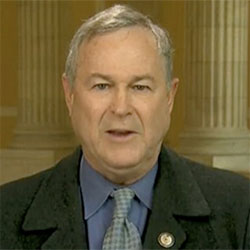“We have sent the message loud and clear to the Chinese Communist Party that we demand an immediate end to the persecution of the Falun Gong, that we demand that all jailed Falun Gong practitioners and other prisoners of conscience be released, and that we call on China to immediately stop its inhumane and unethical practice of organ harvesting.” —Congresswoman Ileana Ros-Lehtinen (Fla.)
 “Falun Gong is on the front line against evil. Those of us in the world who want to make it a better world understand the evil forces that are at play. One of the worst evil forces at play are the Chinese Communists that still control mainland China.” — Congressman Dana Rohrabacher (Calif.)
“Falun Gong is on the front line against evil. Those of us in the world who want to make it a better world understand the evil forces that are at play. One of the worst evil forces at play are the Chinese Communists that still control mainland China.” — Congressman Dana Rohrabacher (Calif.) “I know you believe a better day is coming, but it will come sooner rather than later, if we do our part in the congress to speak out, with a clear voice, on behalf of Falun Gong.” — Congressman Chris Smith (N.J.)
“I know you believe a better day is coming, but it will come sooner rather than later, if we do our part in the congress to speak out, with a clear voice, on behalf of Falun Gong.” — Congressman Chris Smith (N.J.) “America was founded by those committed to ensuring religious liberty. Our leaders, government, and civil society must hold our major trade partners and other countries to the same standards.” — Mark P. Lagon, president of the Freedom House
“America was founded by those committed to ensuring religious liberty. Our leaders, government, and civil society must hold our major trade partners and other countries to the same standards.” — Mark P. Lagon, president of the Freedom House “I have such admiration for you. You really are a sort of light shining in the darkness. And by the dignified, the courageousness, and the unyielding way in which you have responded to the terror unleased on you, you truly are a model and an example to all the world.”– Dr. Katrina Lantos Swett, commissioner to the United States Commission on International Religious Freedom
“I have such admiration for you. You really are a sort of light shining in the darkness. And by the dignified, the courageousness, and the unyielding way in which you have responded to the terror unleased on you, you truly are a model and an example to all the world.”– Dr. Katrina Lantos Swett, commissioner to the United States Commission on International Religious FreedomU.S Congressional Resolutions (pertaining to Falun Gong)
- • H.Con.Res.218 (November 18, 1999) – Expressing the sense of the Congress that the Government of the People’s Republic of China should stop its persecution of Falun Gong practitioners.
- • H.Con.Res.188 (July 24, 2002) – Expressing the sense of Congress that the Government of the People’s Republic of China should cease its persecution of Falun Gong practitioners.
- • H.Con.Res.304 (October 16, 2003) – Expressing the sense of Congress regarding oppression by the Government of the People’s Republic of China of Falun Gong in the United States and in China.
- • H.Res.605 (March 16, 2010) – Recognizing the continued persecution of Falun Gong practitioners in China on the 11th anniversary of the Chinese Communist Party campaign to suppress the Falun Gong spiritual movement and calling for an immediate end to the campaign to persecute, intimidate, imprison, and torture Falun Gong practitioners.
- • H.Res.343 (June 13, 2016) – Expressing concern regarding persistent and credible reports of systematic, state-sanctioned organ harvesting from non-consenting prisoners of conscience in the People’s Republic of China, including from large numbers of Falun Gong practitioners and members of other religious and ethnic minority groups.
In addition to Congressional attention, the Department of State and Congressional-Executive Commission on China’s annual human rights report has regularly detailed large scale arbitrary detention, sexual abuse, torture, and death of Falun Gong practitioners at the hands of Chinese security agencies. It has also closely followed threats to Falun Gong practitioners’ rights in Hong Kong and Macau, including instances of discrimination and restrictions on entry into the territories.

